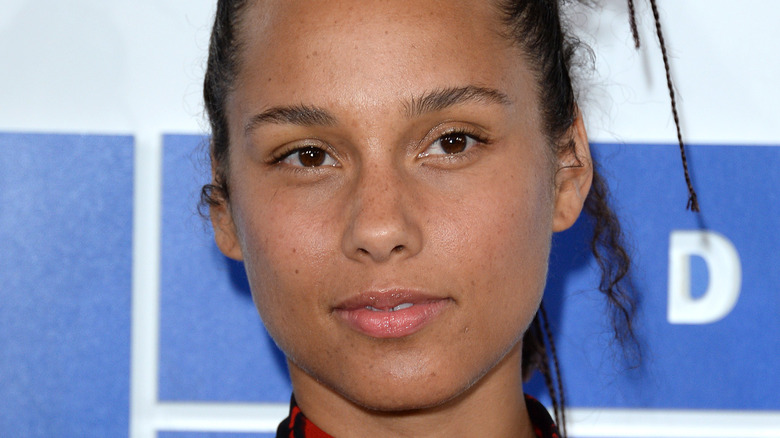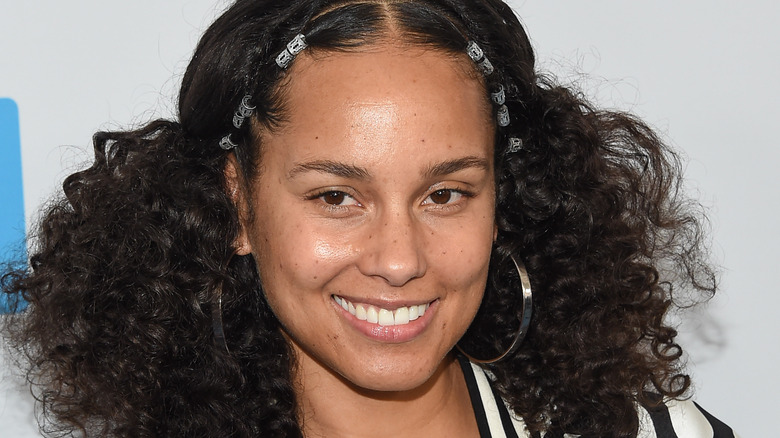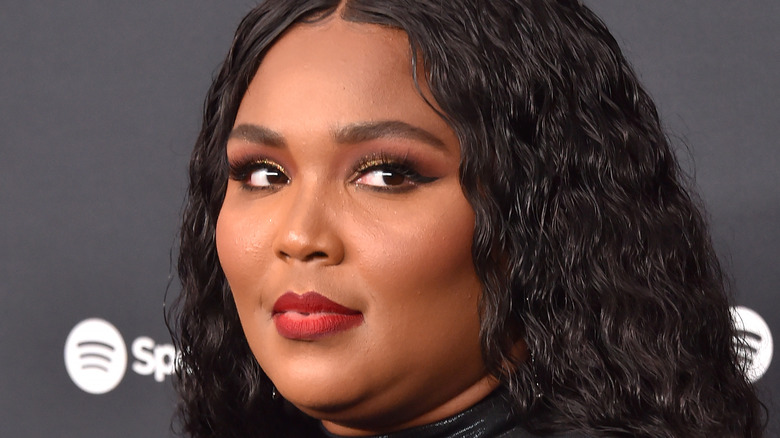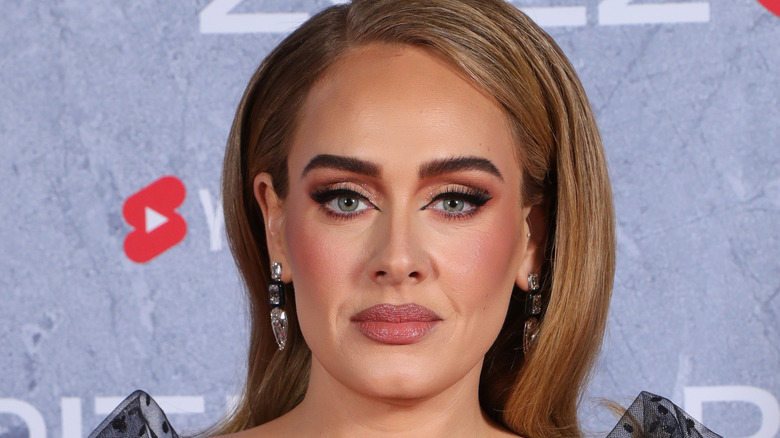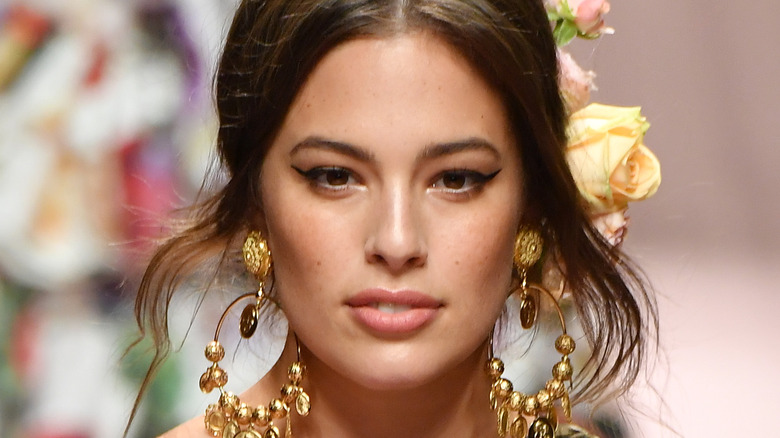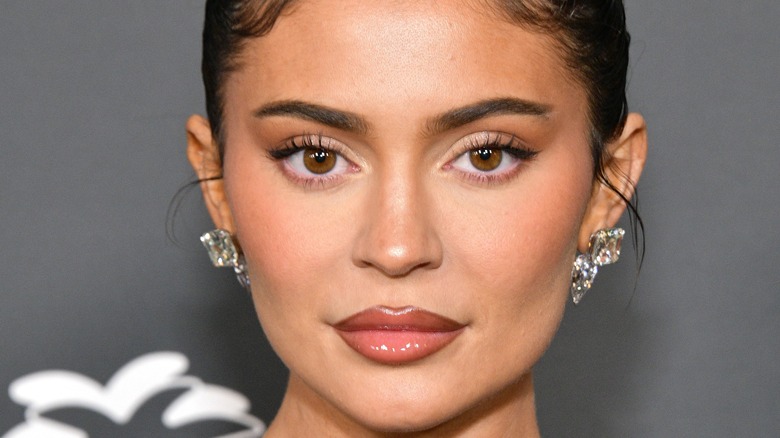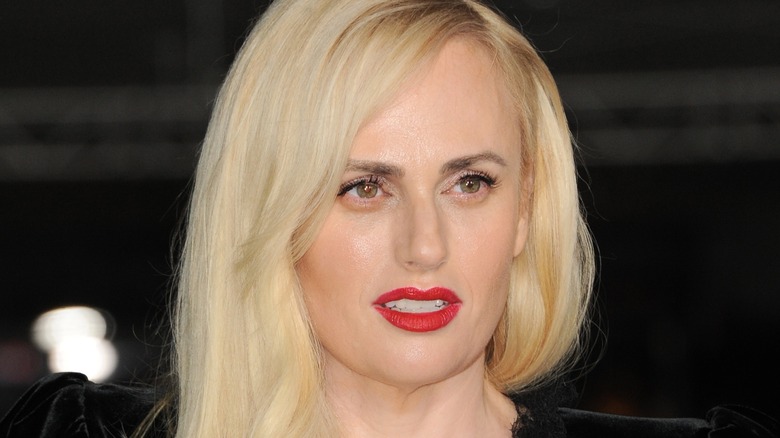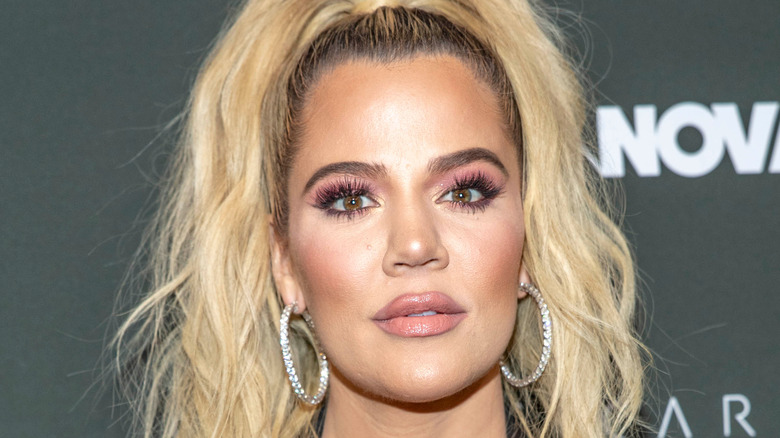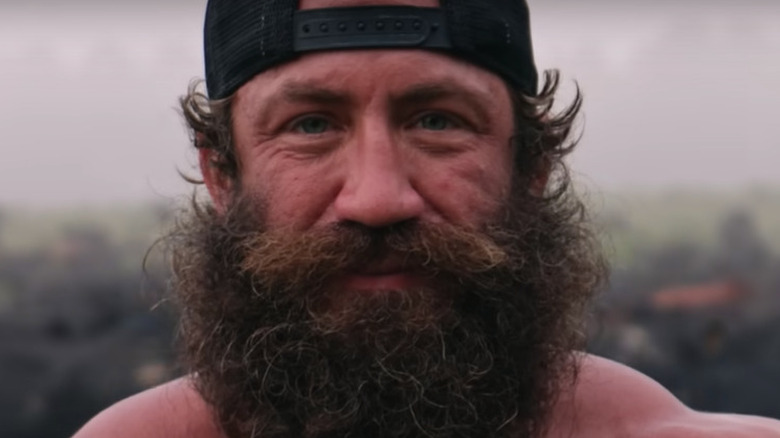Celebs Who Got Called Out After Flip-Flopping On Hollywood Beauty Standards
In 2018, "Romping Shop" hitmaker and dancehall sensation Spice (real name Grace Latoya Hamilton) set the internet ablaze when she posted a since-deleted picture of her whitened skin on Instagram (via Vibe). Although the image first set off the assumption that Spice's signature look — a cocktail of glowing ebony skin and a well-fit blue wig — was no more, it turned out to be a hoax. "I wanted to shock the world, have their undivided attention, and then I could get a chance to talk about colorism," the "Love & Hip-Hop Atlanta" star confessed. A number of fans took to social media to voice their disapproval of the singer's approach.
"She can speak about it without bleaching her skin. Honestly she's teaching self hate with the skin bleaching. All it shows me is that you DO NOT LOVE the SKIN you are in PERIOD!!!!!" One aggravated user wrote via Twitter.
While Spice went above and beyond to get heard and put her point across, other celebrities have similarly altered the public's perception of their already-established image. Whether these were isolated or permanent instances, here are the times beauty standards in Hollywood were put to a test.
Alicia Keys started a skincare line
In a Lenny Letter post titled "Time to Uncover," 15-time Grammy Award winner Alicia Keys detailed the impact makeup had on her day-to-day life. "Every time I left the house, I would be worried if I didn't put on makeup: What if someone wanted a picture?? What if they POSTED it???" wrote Keys.
In the essay, Keys revealed that her insecurities lessened after an encounter with a photographer during the cover shoot for her hit single "In Common." She championed a no-makeup trend, walking red carpets makeup-free and being the poster child for natural beauty in Hollywood.
May 6, 2022, was therefore a shocker for Keys' diehard fans when the "Superwoman" singer announced the launch of a skincare line dubbed "Keys Soulcare," featuring an assortment of colored lip balms. "I get to create my own beauty standards," Keys declared. Some of the singer's followers expressed their disappointment. "Alicia Keys putting out makeup now? What a f***ing hypocrite," an unimpressed Twitter user wrote, further adding, "To be able to have perfect skin like hers is only a result of extensive skincare treatments/facials normal people can't afford. Now after years of sh***ing on makeup she wants to sell it? F*** off."
Lizzo went on a 10-day detox
For the debut of her third studio album, "Cuz I Love You," Lizzo shared a nude album cover through a tweet. The naked artwork inspired fans across the world to be proud of their physique. Her show of confidence, however, doesn't exempt her from struggles as a body positivity enthusiast. In a 2020 TikTok post, the "Truth Hurts" singer expressed that she'd been having negative thoughts. "Normally, I would have some positive thing to say to get me out of this, but I don't," she revealed.
Days later, Lizzo went on a 10-day detox facilitated by nutrition expert JJ Smith. While the exercise was received well by most of her devotees, others felt offended. "It's WAY too irresponsible to promote diet culture to a fanbase that relies on you to counter mainstream body narratives. It's never worth the coin," a tweep wrote in part.
Lizzo responded by sharing a picture of herself on Instagram, wearing nothing but underwear, along with a caption that partially read: "To the people who look to me, please do not starve yourselves. I did not starve myself. I fed myself greens and water and fruit and protein and sunlight. You don't have to do that to be beautiful or healthy."
If you are struggling with an eating disorder, or know someone who is, help is available. Visit the National Eating Disorders Association website or contact NEDA's Live Helpline at 1-800-931-2237. You can also receive 24/7 Crisis Support via text (send NEDA to 741-741).
Adele's weight loss sparked controversy
According to an interview with Vogue, "Rolling in the Deep" singer Adele Adkins had an anxiety-filled year right before the pandemic. To get by, Adkins immersed herself in self-care. "It was a lot of sunbaths. It was a lot of meditation. It was a lot of therapy. And a lot of time spent on my own," Adkins told the publication. More than anything, the vocalist found herself embracing fitness. "The gym was key," she said. What resulted was a 100-pound shed, according to a fan's encounter with the "I Drink Wine" star as told to People.
A day after her 32nd birthday, Adkins took to Instagram to thank her fans for their wishes. The picture broke the internet and attracted remarks on different platforms, some for and some against her evolved image. "@Adele Like so many public women you are a poor role model," a Twitter user wrote. "When it is convenient you advocate that being obesely overweight is OK but when the penny drops and you lose weight and are clearly more attractive you advocate weight loss."
Going by the overbearing heart emojis that flew around, most of Adkins' fans gave her a nod. For her detractors, however, she let them know that not a bit had changed on the inside during a sit-down with media mogul Oprah Winfrey (via Entertainment Tonight). "I was body positive then and I'm body positive now," she voiced.
Ashley Graham's 2016 picture ignited a debate
In an industry with way too many restrictions — proven by Tyra Banks' post detailing the removal of an upper age limit from "America's Next Top Model" (via Vogue) — Ashley Graham has built a following by challenging the status quo. Her speech "Plus Size? More Like My Size," delivered at a TEDx event, has attracted 4.3 million views on YouTube as of this writing. "Curvy models are becoming more and more vocal about the isolating nature of the term 'plus-size,'" she states. "We are calling ourselves what we want to be called: women, with shapes that are our own."
Graham has walked the runway since her teens and gained an influential status to the tune of millions of followers. In 2016, she shook the interwebs with an Instagram post in which she looked leaner. Although the comments section was filled with encouragement, a couple of fans weren't dazzled by her transformation. "Next thing you know she'll be shaped like a stick as all the 'regular' models, and still claim to represent oversize people lol," one such critic expressed. " But hey, who am I to judge? Her bank account got more $$$$ than I could ever get. Sooooo, life goes on. Live your life and let her live hers."
Graham addressed such views when she penned a writeup on Lenny Letter, arguing that adults who went to extreme lengths to air their two cents worth were setting unhealthy examples for the younger generation.
Kylie Jenner got rid of her lip fillers
During a "Keeping Up With the Kardashians" reunion special, Kylie Jenner detailed the particulars of an escapade that forever changed her life. "I had really small lips, and I didn't ever think about it until I had one of my first kisses and a guy said to me, 'Oh my God, you're such a good kisser. We have such small lips,'" Jenner narrated.
An insecurity creeped in, which birthed two things; the use of lip fillers and a love for makeup. Kylie Cosmetics launched in 2015 (via Racked) with a set of lip kits, and has since morphed into a one-stop shop for all things beauty and skincare. Jenner has become a multi-millionaire in the process, per Forbes. In a 2018 Instagram post, re-shared by Comments by Celebs, Jenner admitted to a change when a fan pointed out that she resembled her old self. "I got rid of all my filler," she wrote.
With the revelation came a whole load of distaste, as a tweep wrote, "the biggest scam of the decade is when Kylie jenner got lip fillers and then lied abt it and started selling lip kits so ppl could get bigger looking lips and then made a billion dollars and then was lol sike and got her fillers taken out lmao ... her mind." The comment may have slipped past Jenner, who has a tendency to clap back at fault-finders.
Rebel Wilson's clothing line excluded plus-size options
Since stepping into the entertainment scene as the breakout star of the 2011 flick "Bridesmaids," Australian actor Rebel Wilson has become Hollywood royalty, often with characters centered around her frame. Wilson's most popular role to date remains that of Fat Amy, from the box-office hit "Pitch Perfect."
This fact was a bone of contention in the process of Wilson's publicly documented fitness journey. "I got a lot a lot of pushback from my own team actually here in Hollywood when I said, 'Okay, I'm going to do this year of health,'" she revealed in an interview with the BBC. All was well with Wilson's fans until she announced the launch of a clothing line in which plus sizes were suspiciously missing. The Instagram story read, "We are experimenting with this limited capsule collection of only two pieces in limited sizing," per Fox.
An online discourse ensued, with a focus on her lack of inclusivity and pricing. "I don't know what's crazier; rebel wilson [sic] not having plus size clothing options even though she literally was just very plus size, or the fact that she's charging over $100 for a pair of basically plain white sweats," a Tweet partially read. Wilson had previously addressed society's appearance-based bias in her conversation with the BBC. "I know what it's like to be a woman who is essentially invisible to most people because of not being seen as traditionally, like, beautiful or whatever," she'd said.
Khloé Kardashian allegedly photoshopped her pictures
"Revenge Body" creator Khloé Kardashian launched her show for all the right reasons, as she gave away in an interview with "The Ellen DeGeneres Show." Speaking to the talk show host, Kardashian said, "I'm taking these people and trying to get them out of these holes but teach them the tools but to make them happy from the inside out." In a similar fashion, Kardashian's Good American collection prides itself on promoting body positivity through all-roundedness. She equally delighted fans when she openly embraced her stretchmarks in a past Instagram post.
More than once, Kardashian (and some of her family members) has been accused of flip-flopping on the active lifestyle. In one such occurrence, an unflattering picture leaked online (via E!), one which Kardashian fought fiercely to take down. "khloe kardashian trying to get an unedited bikini photo of her removed from the internet after trying to preach body positivity is the definition of hypocrisy," a tweep wrote when the news broke. In a separate incident, the "Keeping Up With the Kardashians" superstar was accused of editing her waistline in a since-deleted Instagram post (via Daily Mail).
"...She and her sisters created a 'beauty standard' thats not naturally attainable and knowing that they all resort to photoshop," a different Twitter user expressed. Only years prior, Kardashian had come under fire for advertising flat tummy tea, all while encouraging the gym way of life.
Liver King admitted to using steroids
YouTuber Liver King (real name Brian Johnson) has tailored an entire brand based on healthy living. The self-proclaimed Chief Executive Officer of the ancestral lifestyle has amassed 241,0000 subscribers and counting at the time of writing, in addition to more than a million Instagram followers. His approach? Eating raw liver, intense workouts, and hunting are all meant to be part of the fitness influencer's overall goal: fulfillment of what he calls "ancestral tenets."
In an hour-long YouTube video titled "The Liver King Lie," YouTuber Derek Cole, famed for the channel More Plates More Dates, uncovered a flaw in King's game plan. Cole shared leaked emails in which the influencer alluded to spending $11,000 on performance enhancing drugs. When King made an appearance on Valuetainment, he came clean. "So I said, 'Tell me exactly what minute to go to.' So, then I went to the minute that they told me to go to, and then they start reading the email that I sent and I said 'Holy Sh**,' like, I did this," he confessed.
As is the norm when such an uproar occurs, the public's opinion is inevitable. A Twitter user wrote, "Liver King is the epitome of what can go wrong with an influencer. It's [sic] can be hard to tell what's real or fake on the internet anymore." The comment further insisted that the false lifestyles portrayed by influencers such as Liver King were only for capital gain and took advantage of audience naivety.

